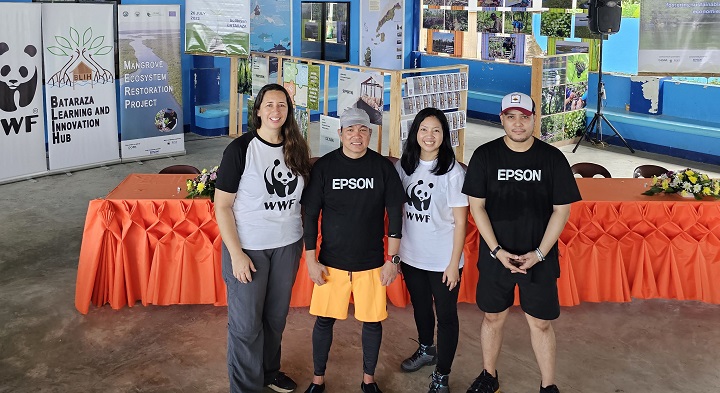
Global technology leader Epson, in collaboration with the World Wide Fund for Nature (WWF) Philippines, EU Ocean Governance, and the Bataraza local government, has successfully launched a new community learning and innovation hub (CLIH) in Bataraza, Palawan, meant to establish a learning network that builds the capacity of the local coastal communities through knowledge exchange and sharing best practices, while promoting collaboration. In conjunction with World Mangrove Day on June 26th, representatives from Epson and WWF visited CLIH in Barangay. Buliluyan, Bataraza, to celebrate the special occasion with local communities and volunteers.
The restoration project was previously launched in the nearby municipality of Balabac in August 2022, which was followed by the official launch of the Bataraza Learning and Innovation Hub (BLIH) in January of this year. Together with partner stakeholders in Balabac and Bataraza, the project is implementing a local capability development programme that includes biophysical, socio-economic, and governance aspects of ecosystem restoration, and community knowledge exchange.
This component is part of the WWF-Coral Triangle Programme’s bigger initiative focusing on the Sulu-Sulawesi Seascape, a marine ecoregion shared with Indonesia and Malaysia, known for its rich and significant levels of marine biodiversity. The initiative is also supported by Epson under the regional partnership with WWF and aims to create scalable conservation activities, primarily focused on restoring degraded or damaged coral reefs and mangrove areas. Through the restoration activities, best practices and lessons learned are cross-shared through the community learning and innovation hubs, and community champions are trained for co-management of restored and existing coral reef and mangrove areas.
“This is just one step towards our global commitment of reaching out to communities and continuing our support towards restoring and protecting the Philippines’ rich biodiversity. Our continuing partnership with WWF enables us to work toward a shared goal of a greener future for all,” shared Masako Kusama, President and Director of Epson Philippines Corporation. “The work we do with WWF underpins Epson’s goals to champion projects that support biodiversity, inspire collaborations, and enrich lives, not just in the Philippines but across the region as well.”
“Since the launch of the Bataraza Learning and Innovation Hub (BLIH) and other succeeding activities involving the local government unit, the community, the private sector including the academe and civil society organisations, we have been empowering communities by enabling them to share and gain knowledge and practice from each other,” Project Manager at WWF-Philippines, Mary Joan Pecson said.
Known as one of the nature-based solutions to address climate change, mangroves play a key role in ecosystems, providing benefits for both nature and people. Mangroves store 7.5 to 10 times more carbon per acre (3 to 4 times more per hectare) than tropical forests, and their loss contributes to 10% of global greenhouse gas emissions from deforestation. Unfortunately, 62% of the world’s mangroves have been destroyed between 2000 and 2016.
“Our Local Government strongly supports conservation initiatives geared towards protecting the mangroves in Bataraza. By establishing partnerships with multi-sectoral groups and the coastal communities, we innovate long-term solutions to restore degraded coastal and marine ecosystems and prioritise the welfare of our people,” said Hon. Abraham Ibba, Mayor of Bataraza.
“The destruction of our mangrove forests results in the decrease of our marine resources since part of their habitat has been destroyed,” said Bataraza Municipal Environmental and Natural Resource Officer, Mr. Reynaldo Rivera, EnP.
“Mangrove forests serve as filters and protection against siltation of the sea and coral reefs and from the big waves reaching the shoreline, which may cause damage to residential houses and other properties. There is really a need for the rehabilitation of our mangrove forest,” he added, highlighting how the destruction of the mangrove swamps affects not only the environment and marine life but also the community.
The Learning Hub in Bataraza is set to be a best practice example that can be replicated in other locations across the Coral Triangle. With the support from Epson and other partner stakeholders, WWF-Philippines aims to further expand the initiative to neighbouring areas to build a more climate-resilient future for communities.

